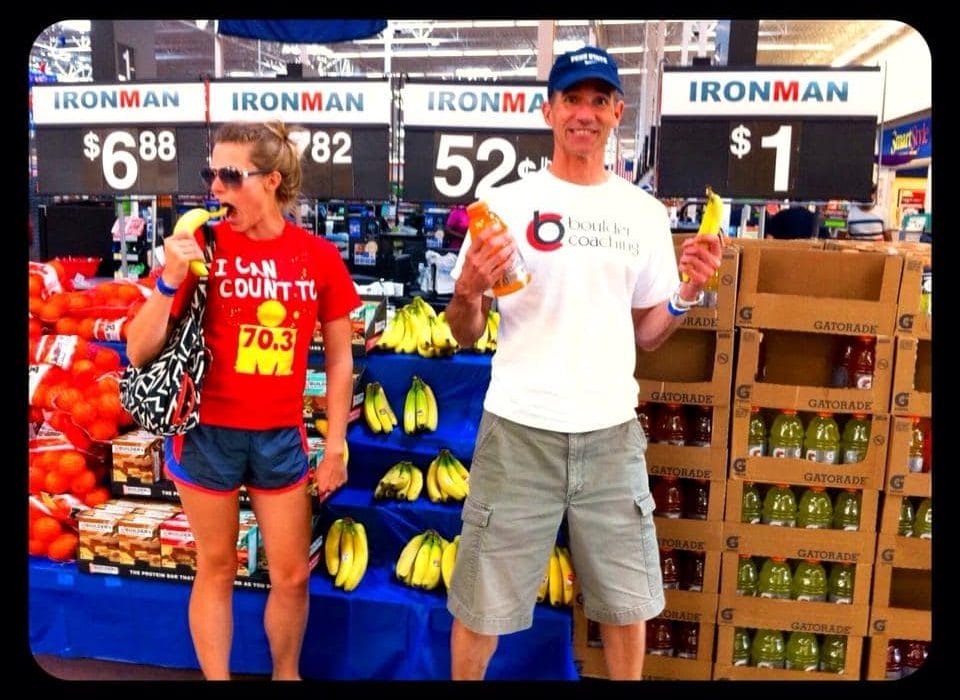
There comes a time in every triathlete’s life when they go from participant to spectator/supporter.
- Does being a triathlete make for a different spectating/supporting experience than for the non-triathlete?
- Is there a bond between two triathletes that the lay supporter can’t penetrate or understand?
- Does a triathlete have something special to contribute to the racer and if so, is it wanted and needed?
These are some of the questions that popped up when we were doing another article on spectating, so we decided to put them out there.
Both Jodi’s daughter, Lindsay, and Jodi’s husband, Guy, have at times, been in the roles of triathlete and spectator/supporter. Lindsay had this to say about having her dad as supporter at one of her first races:
There is a different type of support role he can provide, because he is a seasoned triathlete. The support he gives is different than someone who has never done the sport. Being new to the sport myself, he already knew where to be – tips and tricks – from taping GU on the bike to sharp, slippery turns on the bike course – best places to eat – he even packed a tri-dad bag full of supplies he knew I’d need, but I wouldn’t think of.
He called to review my pack list before my flight. He put together my bike. He booked the hotel. He planned and routed my pre-race workouts and drove the course with me. He gave me step-by-step advice on the course, because he’s done it before. I cannot tell you how amazing this is for a newbie. I was stress free…I had someone there to answer all my questions. It’s like the coach everyone dreams of having.
Having had the expereience, she put together these tips for supporting your triathlete, if you’re a triathlete yourself:
- Remember this isn’t your race. This is THEIR race. They may need to prep different, eat different, and race different. You need to support whatever they need you, even if it’s not your style. Try not to get preachy about how you think it should be done.
- Don’t get micro-managey. Let them have their space. The athlete knows what they need and would get everything done, even if you were not there. See #1.
- Everyone races differently and has different ideas of what success vs a bad race is. This is a big one, especially for parent-child relationships. Sometimes the triathlete’s times may be slow…but they had a great race in spite of cramping or puking or whatever – they persevered and crossed that line. You need to be proud and happy for them whatever they do. Don’t start harping on them for slow times or performance while they are waiting in line to receive their medal. Let them have their moment and their time and let them decide for themselves whether this was a good or bad race. You are here to support them – not coach them. Leave the discussions on how to improve for the next race for later…enjoy the moment of that finish now.
- Discuss how you can help them from the race sidelines before the race. Personally, I like being told my place out of the swim. And, along the run, I want to know my place…how far ahead the next girl in my AG is…maybe even my pace. Some triathletes may just want to be cheered on like crazy! Some triathletes may want to know just pace…or be pushed on through tough love like, “Dig deep. I know you can go faster! GO!” I know, personally, I hate it when people tell me to go faster or give me tough love cheers. This is why I suggest you have this discussion prior to the race.
- Write down the triathlete’s goal times/pace. This goes with #4. It might give a clue as to when to see them…what to tell them as they pass by…etc. It’s a biggie. You already know how important those numbers are anyways!
We thought this was great advice for the triathletes out there, as they will all find themselves in this role at some point in time…..
DO YOU THINK TRIATHLETES MAKE BETTER SUPPORTERS?

Sherry is one of the TriWivesClub and LifeDoneWell co-founders and contributes to multiple blogs. She is a former co-owner of the California Apparel News and had a career in the healthcare industry. Her passions include traveling, real food, the environment, and animal rescue/welfare. She lives a healthy lifestyle and has been a vegetarian since 1987. She and her husband are parents to two rescue pups and reside in Connecticut.











